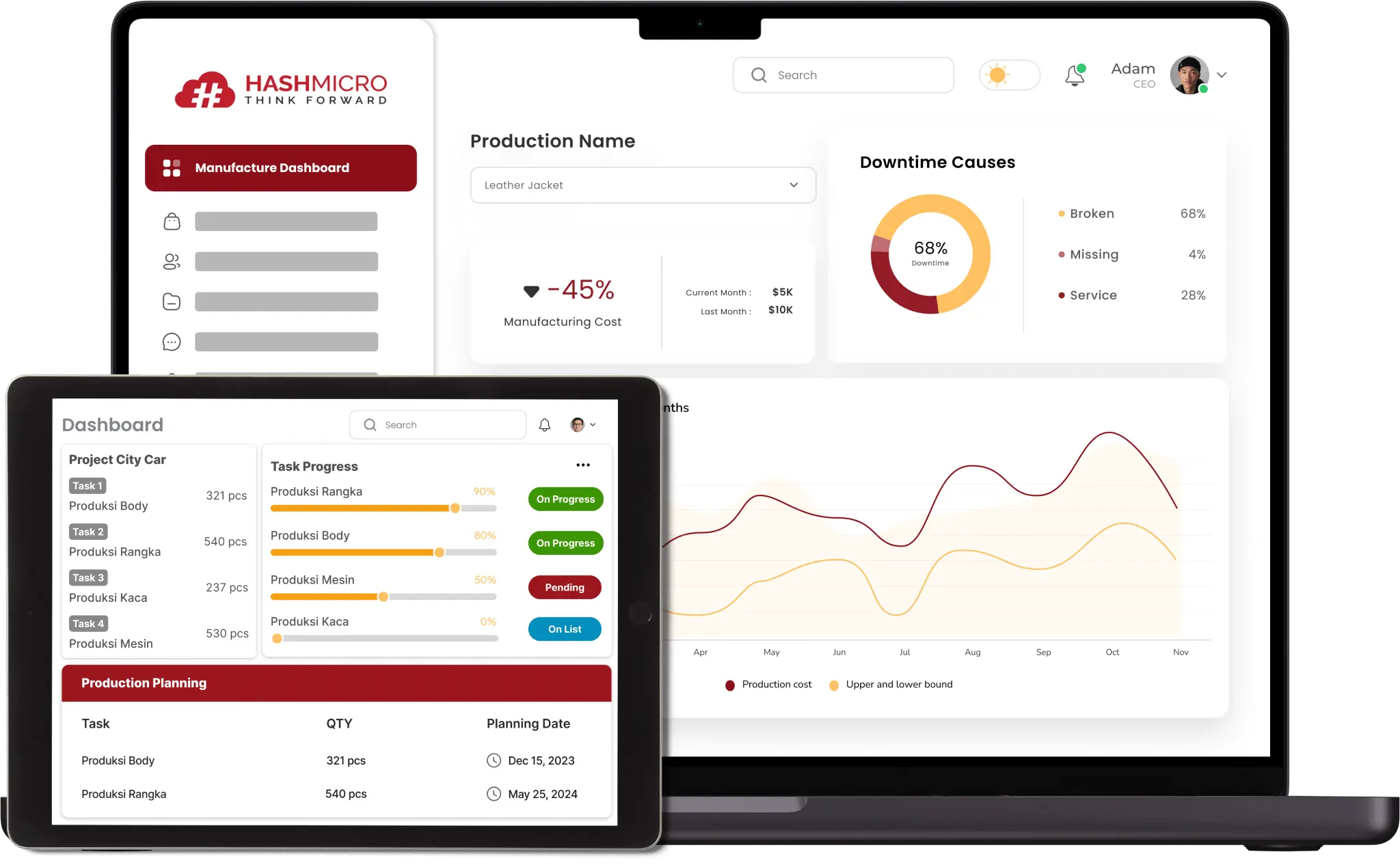What happens when your production line cannot adapt to sudden changes in demand or product design? Many manufacturers still rely on rigid systems that slow response times and increase costs. These limitations make it harder to stay competitive in fast-changing markets.
A flexible manufacturing system helps manufacturers respond faster by using computer-controlled machines and automated workflows. It allows quick product changes without sacrificing accuracy or quality. This approach improves efficiency while supporting diverse production requirements.
For businesses in Singapore, adopting a flexible manufacturing system is becoming essential for scalable growth. HashMicro Manufacturing Software supports this flexibility through integrated planning, inventory control, and real-time monitoring. Book a free demo to see how HashMicro optimizes manufacturing operations.
Key Takeaways
|

What is a Flexible Manufacturing System?
A Flexible Manufacturing System (FMS) is an advanced production setup that allows manufacturers to handle different products within the same system. Unlike traditional methods, which require major adjustments for every change, FMS uses computer controlled machines and automated material handling to switch tasks quickly with minimal downtime.
Simply put, FMS combines automation and adaptability to improve efficiency and scalability by coordinating flexible manufacturing equipment to meet changing production needs.
Many businesses use flexible manufacturing system notes when planning adoption because successful implementation requires technology and skilled operations. FMS allows companies to reduce waste, respond faster to market changes, and stay competitive.
Types of Flexible Manufacturing Systems
Before implementing FMS in your business, it’s important to understand the main types and how they fit different production strategies.
Each type offers a unique level of flexibility and automation, and choosing the right one often depends on your product mix, demand variability, and use of technologies such as manufacturing software.
1. Flexible Manufacturing Cell (FMC)
This is the simplest form of FMS, consisting of two or three machines connected by a material-handling system. FMC is ideal for small-scale production where some flexibility is needed but full integration isn’t required. It’s often used in environments with a limited variety of parts.
2. Flexible Manufacturing System (Full FMS)
A fully integrated FMS includes multiple machines, automated guided vehicles (AGVs), and centralized computer control.
It is highly adaptable and can produce different parts with minimal human intervention. Many businesses combine this setup with advanced manufacturing software to optimize scheduling, track performance, and maintain quality.
3. Make to Assemble FMS
In make to assemble FMS, parts are manufactured and kept in inventory until customer orders arrive.
Once the order is placed, final assembly is done quickly. This approach combines efficiency with responsiveness, making it well-suited for industries prioritizing customization without sacrificing delivery speed.
Benefits of a Flexible Manufacturing System (FMS)
Implementing a Flexible Manufacturing System is a strategic decision that enhances operational agility and strengthens overall business performance. Below are the key benefits ranked by their impact on competitiveness and profitability:
- Enhanced responsiveness to market dynamics: The capability to adapt rapidly to evolving customer demands and market fluctuations is essential for maintaining a competitive edge.
- Superior production flexibility: An FMS allows multiple product variations to be manufactured within the same system, reducing the dependency on dedicated setups. This level of flexibility supports businesses with diverse product portfolios and frequent design updates.
- Significant reduction in inventory costs: By facilitating on-demand production, an FMS minimizes the need for large inventory holdings. This reduces storage expenses and improves working capital efficiency, aligning operations with lean manufacturing principles.
- Improved operational efficiency and changeover speed: Automated scheduling and centralized control systems enable swift transitions between production runs.
- Consistent and superior product quality: Automation and precise control significantly reduce human error, ensuring adherence to quality standards and regulatory compliance.
How Does the Flexible Manufacturing System (FMS) Work?

A flexible manufacturing system operates through an integrated network of automated machines, material-handling systems, and centralized computer control. At its core, FMS relies on advanced scheduling and monitoring software to manage production tasks, machine operations, and workflow coordination.
The process begins when production requirements are entered into the system. The central control software assigns tasks to different machines, manages tool changes, and directs automated handling equipment to move materials between stations.
This level of coordination allows FMS to switch between product types with minimal downtime, maintain consistent quality, and optimize resource utilization.
By combining automation with real-time data and intelligent control, FMS delivers a highly adaptable and efficient manufacturing environment that can respond quickly to changes in demand.
Advantages and Disadvantages of a Flexible Manufacturing System (FMS)
While a Flexible Manufacturing System offers significant advantages in terms of efficiency and adaptability, it also comes with certain challenges that businesses must evaluate before implementation. Understanding both sides is crucial for making informed investment decisions.
| Aspect | Advantages | Disadvantages |
| Flexibility | Quickly adapts to product changes and market fluctuations. | Requires complex planning and a skilled workforce. |
| Efficiency | Reduces downtime and optimizes machine utilization. | High initial investment in technology and infrastructure. |
| Quality | Automation ensures consistency and reduces human error. | System failures can cause widespread disruptions. |
| Inventory | Supports lean manufacturing by reducing excess inventory. | Limited cost savings in low-volume production scenarios. |
| Scalability | Scales operations without major reconfiguration. | Integration with existing systems can be challenging. |
Flexible Manufacturing System Examples
Understanding how flexible manufacturing systems are applied in real-world scenarios provides valuable insight for businesses evaluating this technology. In Singapore’s manufacturing landscape, where precision and rapid adaptation are essential, FMS has become a critical enabler of efficiency and competitiveness.
For instance, electronics manufacturers implement FMS to accommodate frequent product updates without slowing production, ensuring timely delivery for global clients. Aerospace companies rely on FMS to produce highly complex components accurately, reducing waste and minimizing costly errors.
In the automotive sector, FMS supports custom manufacturing by enabling make-to-order and make-to-assemble workflows. This allows manufacturers to offer tailored solutions without compromising on speed or cost.
These examples illustrate why many businesses in Singapore consider FMS a strategic investment rather than a mere technological upgrade. By integrating automation, intelligent scheduling, and advanced manufacturing software, companies achieve higher flexibility, improved resource utilization, and a stronger competitive position.
Why Choose HashMicro for Your Flexible Manufacturing System Needs?

Implementing a flexible manufacturing system requires more than advanced technology. It demands a reliable, scalable, and aligned solution with your business objectives.
HashMicro provides a comprehensive platform designed to help manufacturers in Singapore streamline production, eliminate bottlenecks, and improve decision-making through automation and real-time visibility.
Our solution integrates intelligent planning tools, seamless process control, and data-driven insights to enable businesses to adapt quickly to market changes while maintaining cost efficiency and product quality. These capabilities ensure operational agility and long-term competitiveness.
Below are the key features that make HashMicro’s flexible manufacturing system a strategic choice for your organization:
- Centralized production control: Gain complete visibility across the entire manufacturing process within a single, integrated platform.
- Automated scheduling and planning: Optimize production schedules using intelligent algorithms that minimize downtime and maximize efficiency.
- Real-time inventory management: Maintain accurate stock levels and prevent disruptions through automated material tracking and replenishment alerts.
- Integrated quality control: Ensure product consistency with built-in quality checkpoints and compliance monitoring throughout every production stage.
- Customizable workflows: Adapt workflows to fit your operational requirements including make-to-order, make-to-stock, and make-to-assemble processes.
- Comprehensive reporting and analytics: Access actionable insights through real-time dashboards and advanced analytics to support strategic decisions.
Conclusion
A Flexible Manufacturing System is a strategic investment that boosts efficiency, adaptability, and competitiveness. It enables faster production changes, optimized resource use, and consistent quality helping businesses overcome modern challenges and seize growth opportunities.
To maximize these benefits, you need the right partner. HashMicro offers an integrated Flexible Manufacturing System built for businesses in Singapore. Our solution combines automation, smart planning, and analytics to streamline operations and support quick responses to market changes.
Take the next step toward smarter manufacturing. Request a free demo from HashMicro and see how our solution improves efficiency, reduces costs, and prepares your business for the future.

FAQ Flexible Manufacturing System
-
Why do we need FMS?
Remarkable accuracy and reliability from FMS improve quality control and data monitoring can identify and address quality problems quickly. Production is more efficient because very little downtime is needed to set up for different products or product variations.
-
What is a major advantage of flexible manufacturing systems?
The main advantage of a flexible manufacturing system is its high flexibility in managing manufacturing resources like time and effort to manufacture a new product. The best application of a flexible manufacturing system is found in the ‘production of small sets of products like those from mass production.
-
What are the problems with FMS implementation?
FMS planning and implementation problems can be classified as design, planning, scheduling, control problems. The design problems include obtaining the required number of tools and the various buffers along with required amount the material handling system can handle.






























